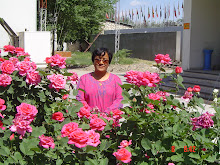by Devaki Shrestha
July 2003 - On 23 March 2002, Afghanistan's schools for girls and boys were officially opened with the "Back-to-School" slogan after the fall of the Taliban regime. The United Nations Children's Fund (UNICEF) led the campaign. The World Food Programme (WFP) strengthened the programme with the "School Feeding" project for food deficit areas affected by drought all over Afghanistan. WFP started its "Food for Education" component during the emergency operation to support the transitional government of Afghanistan. Later it was extended under the "Protracted Relief and Recovery Operation" with effect from 1 April 2003.
The percentage of girl students in the schools in Hirat is around 55 percent (Department of Education, Hirat), whilse the figure is very low in the remote districts and provinces. WFP strongly believed that food aid as an incentive will increase participation in education and will help to rebuild educational infrastructure, enhance knowledge and skills and will motivate teachers. The WFP programme covers all four provinces of Western Afghanistan -- Hirat, Badghis, Farah and Ghor. The enrollment of girls was very low in Badghis, Farah and Ghor. At the same time the number of female teachers is also very low in these provinces. The girl student enrolment in Hirat city was quite reasonable but the school authorities were handicapped with the limited absorption capacity and unavailability of school space as enthusiasm shown by the parents to send their children to school was astonishing. The education authorities managed to have classrooms in the tents with the support of agencies like UNICEF and IOM. This helped to make space for primary school students. The willingness shown by the parents to send their daughters to school after the lifting of ban imposed by previous regime was extremely encouraging.
In 2002, the WFP Area Office in West started theschool feeding programme with bread distribution produced by the women from low income groups in Kohsan district of Hirat Province. Later the bread feeding was replaced by the biscuit feeding programme. Currently, the WFP Hirat Area Office has been successfully implementing school feeding project in the target area covering around 38,000 school children against the country wide target of reaching over I million children. Among them, girls are 21 percent. About 6,137 girls (21 percent) are receiving four liters of oil for attending at least 22 school days in the class as take-home-ration incentive to the family as a whole.
Most of the schools are lacking minimum level of school facilities. Many NGOs, bilateral agencies, UNICEF and WFP have played a significant role in creating a favorable environment by providing educational, motivational and material support to bring all these children to schools from food insecure areas and also from districts with low enrolment of girls. These districts include Bakwa and Balabuluk, where there was zero girl enrolment. After the start of "School Feeding" project and distribution of oil incentive to the girls, there was a positive initial response from some parents to send their daughters to school. Under WFP's school feeding project, every student gets one packet of fortified biscuit (100 grams) per school day. The projects for Badghis and Ghor provinces are in the process. In those provinces another 50,000 students will be covered by the project.
In addition, WFP helps young girls (who were out of schooling during the previous regime) and ex-combatants to enrol in the formal school system. This will be done by offering them functional non-formal education courses and linking the graduates of such bridging courses to the formal school system. Food Aid has been provided to the teachers and participants of such courses to support their living while attending the classes.
The women organizations and the women in the community are supported with a food incentive to participate in vocational training courses. The skills they learn will help them to start micro income-generating activities at their house-hold or community level. Around 1,200 young women have completed the courses recently and 1,408 young women and men are still taking their courses.
WFP signed a "Memorandum of Understanding" in 2002 to support the transitional Government through the Ministry of Education under "Protracted Reconstruction and Recovery Operation" and has shown its commitment to help for retaining the teachers by providing edible oil incentives (10 liter per month/teacher). The incentive will continue for the next two years. About 3,350 teachers already received the oil-ration since February and additional 5,759 teachers will receive in June. In total, about 8,750 teachers from the western province will be supported through the salary supplement to boost their morale as they are receiving minimum amount of salary. Their monthly salary is about US$ 45.
WFP, in participation with UNICEF, is supporting teacher training. The opportunities to receive the training especially for the women teachers will help them to retain their jobs and also will enhance their teaching skills contributing to better quality of education for the children. There is a plan to support all 14 government teacher training institutes across the country with food incentives, either on-site or as a take-home ration.
Saturday, August 30, 2008
Subscribe to:
Post Comments (Atom)

No comments:
Post a Comment